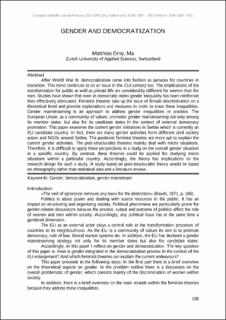Please use this identifier to cite or link to this item:
https://doi.org/10.21256/zhaw-3944| Publication type: | Conference paper |
| Type of review: | Peer review (publication) |
| Title: | Gender and democratization |
| Authors: | Erny, Matthias |
| DOI: | 10.21256/zhaw-3944 |
| Published in: | European Scientific Journal |
| Proceedings: | International Scientific Forum, ISF 2013, Proceedings Volume 2 |
| Volume(Issue): | February 2014 |
| Issue: | Special Issue 2 |
| Page(s): | 198 |
| Pages to: | 213 |
| Conference details: | International Scientific Forum (ISF 2013), Tirana, Albania, 12-14 December 2013 |
| Issue Date: | 2014 |
| Publisher / Ed. Institution: | European Scientific Institute |
| ISSN: | 1857-7881 |
| Language: | English |
| Subjects: | Gender; Democratization; Gender mainstream |
| Subject (DDC): | 305: Groups (age, origine, gender, income) 320: Politics |
| Abstract: | After World War II, democratization came into fashion as panacea for countries in transition. This trend continues to be an issue in the 21st century too. The implications of the transformation for public as well as private life are considerably different for women than for men. Studies have shown that even in democratic states gender inequality has been reinforced than effectively attenuated. Feminist theories take up the issue of female discrimination on a theoretical level and provide explanations and measures in order to erase these inequalities. Gender mainstreaming is an approach to address gender inequalities in practice. The European Union, as a community of values, promotes gender mainstreaming not only among its member states, but also for its candidate states in the context of external democracy promotion. This paper examines the current gender initiatives in Serbia which is currently an EU candidate country. In fact, there are many gender activities form different civil society actors and NGOs around Serbia. The positivist feminist theories are more apt to explain the current gender activities. The post-structuralist theories mainly deal with micro situations. Therefore, it is difficult to apply these perspectives in a study on the overall gender situation in a specific country. By contrast, these theories could be applied for studying micro situations within a particular country. Accordingly, the theory has implications on the research design for such a study. A study based on post-structuralist theory would be based on ethnography rather than statistical data and a literature review. |
| URI: | https://digitalcollection.zhaw.ch/handle/11475/9608 |
| Fulltext version: | Published version |
| License (according to publishing contract): | CC BY 3.0: Attribution 3.0 Unported |
| Departement: | School of Management and Law |
| Organisational Unit: | Institute for Risk & Insurance (IRI) |
| Appears in collections: | Publikationen School of Management and Law |
Files in This Item:
| File | Description | Size | Format | |
|---|---|---|---|---|
| 2891-8475-1-PB.pdf | 579.72 kB | Adobe PDF |  View/Open |
Show full item record
Erny, M. (2014). Gender and democratization [Conference paper]. European Scientific Journal, February 2014(Special Issue 2), 198–213. https://doi.org/10.21256/zhaw-3944
Erny, M. (2014) ‘Gender and democratization’, in European Scientific Journal. European Scientific Institute, pp. 198–213. Available at: https://doi.org/10.21256/zhaw-3944.
M. Erny, “Gender and democratization,” in European Scientific Journal, 2014, vol. February 2014, no. Special Issue 2, pp. 198–213. doi: 10.21256/zhaw-3944.
ERNY, Matthias, 2014. Gender and democratization. In: European Scientific Journal. Conference paper. European Scientific Institute. 2014. S. 198–213
Erny, Matthias. 2014. “Gender and Democratization.” Conference paper. In European Scientific Journal, February 2014:198–213. European Scientific Institute. https://doi.org/10.21256/zhaw-3944.
Erny, Matthias. “Gender and Democratization.” European Scientific Journal, vol. February 2014, no. Special Issue 2, European Scientific Institute, 2014, pp. 198–213, https://doi.org/10.21256/zhaw-3944.
Items in DSpace are protected by copyright, with all rights reserved, unless otherwise indicated.